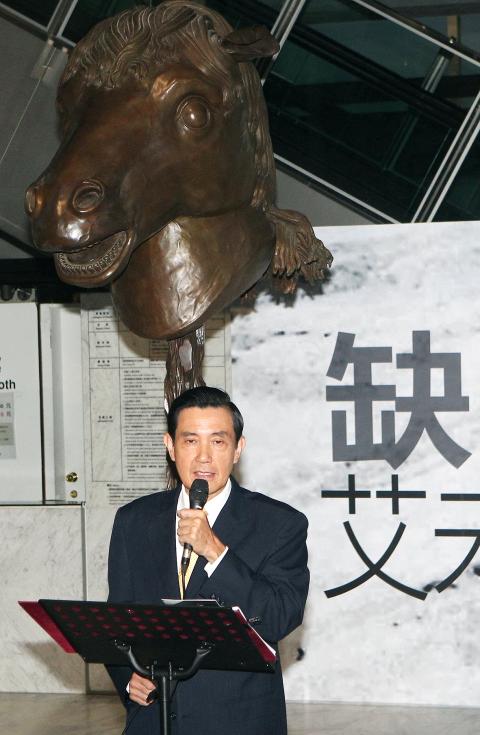President Ma Ying-jeou (馬英九) yesterday called for China to respect human rights and defended Chinese dissident artist Ai Weiwei’s (艾未未) right to freedom of expression as he attended an exhibition of Ai’s work at the Taipei Fine Arts Museum.
Dubbed “Ai Weiwei, Absent,” the exhibition features 21 of Ai’s works, including photographs, installation pieces, videos, 12 bronze heads representing Chinese zodiac symbols and a new piece consisting of about 1,000 bicycles.
Ma praised the diversity, deep emotions and reflections on Chinese society shown in Ai’s artwork and installation pieces, such as a surveillance monitor made of marble, a comment on Ai’s life under the Chinese government’s scrutiny, and said it highlighted the difference between Taiwan and China.

Photo: Hu Shun-hsiang, Taipei Times
“In Taipei, local borough chiefs and residents urged the city government to install surveillance monitors as a public safety measure. It is an interesting observation of how monitors here are rarely used as a tool for the violation of human rights,” he said.
Defending his efforts to press China on improving human rights, Ma said he urged the Chinese government to release Ai and Chinese dissident Liu Xiaobo (劉曉波) in his statement on the 22nd anniversary of China’s Tiananmen Square Massacre on June 4, urging China to respect human rights as a way to promote cross-strait relations.
“The distance between Taiwan and the Mainland depends on the two sides’ views on the protection of human rights. The more similarities we share on the issues of human rights, the closer that distance will become,” Ma said.
In a written statement this year marking the Tiananmen Square Massacre, Ma urged the Chinese authorities to release Liu, Ai and other Chinese dissidents, and called on China to “undertake political reforms and promote the development of freedom, democracy, human rights and the rule of law.”
Ai, an outspoken critic of the control the Chinese Communist Party exerts over Chinese society and censorship in the country, was imprisoned in April on his way to Beijing airport for a planned trip to Taiwan.
He was released in June after almost three months of detention that sparked outrage worldwide.
He is currently being investigated for tax evasion and has been prohibited from leaving the country.
Pan-green lawmakers have accused the Taipei City Government and the museum of failing to help Ai visit Taiwan and attend his own exhibition, which began on Oct. 29 and runs through Jan. 29.
Ma yesterday defended the city government, saying Taipei Mayor Hau Lung-bin (郝龍斌) had invited Ai to attend the opening of the exhibition and the city government has never had a problem with Ai visiting Taipei.
Accompanied by Taipei Department of Cultural Affairs Commissioner Cheng Mei-hua (鄭美華) and Taipei Secretariat Chen Yung-ren (陳永仁) at the exhibition, Ma spent about 15 minutes glancing over the works.
However, he passed over some of Ai’s well-known works, including Study of Perspective: Tiananmen Square, in which Ai gives the finger in front of the square.

NATIONAL SECURITY THREAT: An official said that Guan Guan’s comments had gone beyond the threshold of free speech, as she advocated for the destruction of the ROC China-born media influencer Guan Guan’s (關關) residency permit has been revoked for repeatedly posting pro-China content that threatens national security, the National Immigration Agency said yesterday. Guan Guan has said many controversial things in her videos posted to Douyin (抖音), including “the red flag will soon be painted all over Taiwan” and “Taiwan is an inseparable part of China,” while expressing hope for expedited “reunification.” The agency received multiple reports alleging that Guan Guan had advocated for armed reunification last year. After investigating, the agency last month issued a notice requiring her to appear and account for her actions. Guan Guan appeared as required,

A strong cold air mass is expected to arrive tonight, bringing a change in weather and a drop in temperature, the Central Weather Administration (CWA) said. The coldest time would be early on Thursday morning, with temperatures in some areas dipping as low as 8°C, it said. Daytime highs yesterday were 22°C to 24°C in northern and eastern Taiwan, and about 25°C to 28°C in the central and southern regions, it said. However, nighttime lows would dip to about 15°C to 16°C in central and northern Taiwan as well as the northeast, and 17°C to 19°C elsewhere, it said. Tropical Storm Nokaen, currently

PAPERS, PLEASE: The gang exploited the high value of the passports, selling them at inflated prices to Chinese buyers, who would treat them as ‘invisibility cloaks’ The Yilan District Court has handed four members of a syndicate prison terms ranging from one year and two months to two years and two months for their involvement in a scheme to purchase Taiwanese passports and resell them abroad at a massive markup. A Chinese human smuggling syndicate purchased Taiwanese passports through local criminal networks, exploiting the passports’ visa-free travel privileges to turn a profit of more than 20 times the original price, the court said. Such criminal organizations enable people to impersonate Taiwanese when entering and exiting Taiwan and other countries, undermining social order and the credibility of the nation’s

‘SALAMI-SLICING’: Beijing’s ‘gray zone’ tactics around the Pratas Islands have been slowly intensifying, with the PLA testing Taiwan’s responses and limits, an expert said The Ministry of National Defense yesterday condemned an intrusion by a Chinese drone into the airspace of the Pratas Islands (Dongsha Islands, 東沙群島) as a serious disruption of regional peace. The ministry said it detected the Chinese surveillance and reconnaissance drone entering the southwestern parts of Taiwan’s air defense identification zone early yesterday, and it approached the Pratas Islands at 5:41am. The ministry said it immediately notified the garrison stationed in the area to enhance aerial surveillance and alert levels, and the drone was detected in the islands’ territorial airspace at 5:44am, maintaining an altitude outside the effective range of air-defense weaponry. Following